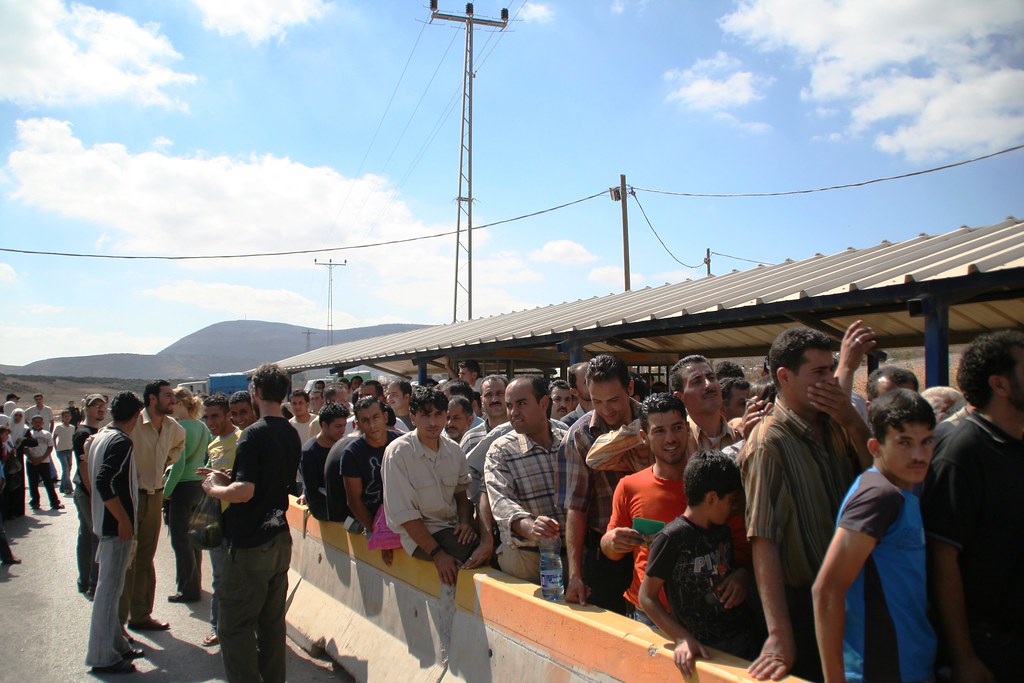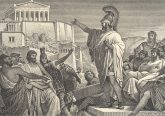
Like the queues in Qalandyia checkpoint and those in front of Laiki Bank, the demonstrations in Nabi Saleh and those in Syntagma Square seem worlds apart. And they are – a military occupation cannot be compared with austerity measures.
However, even though there are many differences between the daily lives of Palestinians and Hellenic nations, they face similar bargaining problems and decisions towards the current status quo. In order to consider if they could apply similar solutions to strive for a brighter future, drawing comparisons between these two situations might help us better comprehend the similar bargaining problems they face.
These actors are all negotiating with a counter-party that is much stronger than them.
The Palestinian Authority negotiates with Israel, the power that has occupied its land for more than 45 years.
The Governments of Greece and Cyprus negotiate with their much richer and more powerful Northern European creditors.
The broker in these negotiations is not neutral.
The United States, which for the past 20 years has acted as the mediator in Israeli-Palestinian negotiations, insists that Israel has “no better friend” than the United States and that their bond is “unshakeable”.
The European Commission, whose unelected officials should equally care about all Europeans, has clear ideological affinities with creditor nations, while European Commissioner Olli Rehn and Eurogroup head Jeroen Dijsselbloem are from creditor countries.
These actors have very weak bargaining positions.
The Palestinian Authority has nothing to offer Israel so that it would stop the occupation of its lands while Greeks and Cypriots have nothing to offer Germany and the EC so that it would not impose such harsh austerity measures on them.
However, the dominating power needs them not to break the status quo.
Israel needs the Palestinian Authority to keep policing, feeding and monitoring the Palestinian People.
Indeed, after the 1993 Oslo Accords, while Israel kept control of the borders and movements of Palestinians, the Palestinian Authority was established to take control over most civilian matters, like schools, transport and policing, doing what some term as the “dirty job” of the occupation. For example, its policing force cooperates with the Israeli occupation in keeping the Palestinians from demonstrating. Without the Palestinian Authority, Israel would have to take back these powers and face growing opposition from Palestinians. Moreover, it would no longer be able to use the Palestinian Authority and the sham negotiations of the last 20 years as a “fig leaf” to shelter itself from international criticism.
Similarly, creditor countries need Greece and Cyprus because they care about the stability of their financial system, the recovery of their loans and the survival of the Euro.
In 2010, Greece was first bailed out because a default on its debt was threatening the stability of its creditors’ banks, which owned a large part of it. Indeed, most bailout money arrived in the coffers of the Greek government only to leave a few days later for German and French banks. Nowadays, the debt is owed to creditor governments themselves but they are still dependent on Greece and Cyprus paying it back, as public opinion might not forgive them more fiscal transfers. Finally, the option of Greece and, more recently, of Cyprus leaving the Euro threatens the whole Eurozone, as a panic in financial markets could lead to a Europe-wide contagion that has the potential to trigger an economic collapse.
Nevertheless, inside and outside their constituencies, many argue that leaving the status quo is a better option for them.
Palestinian leaders, intellectuals and protesters and, famously, Yossi Beilin, the Israeli man who helped set up the Palestinian Authority during the Oslo Accords, have called on President Mahmoud Abbas to dismantle the Palestinian Authority. They argue that this would free Palestinians of the political and economic restrictions imposed by the Oslo Accords while preventing Israel from using it as a cover to entrench its occupation. It would also be a strong message to the international community that the Palestinian people do not accept to live under such conditions indefinitely.
Similarly, many in Greece and Cyprus, the Nobel-Prize winning economist Paul Krugman, and even the German newspaper Der Spiegel have argued that it would be better for both countries to leave the Euro. Staying in the Euro means an incredibly severe depression and very low chances of recovery in the next 20 years. On the other hand, devaluing their currencies could allow both countries to start rebuilding themselves through more trade and cheap tourism. Exiting the Eurozone would also allow them to repeal the austerity policies that have been imposed on them in the past years.
This is why all have used the threat of exit from the status quo as a bargaining chip to pressure the stronger party.
Mahmoud Abbas has been threatening to dismantle the Palestinian Authority over and over since April 2010, saying he would hand over “the keys” for the occupied West Bank to the Israeli government; while in 2011, Greek Prime Minister Papandreou threatened to leave the Eurozone and called a popular referendum on austerity measures, which implicitly questioned membership in the euro zone.
However, these threats did not result in actions for at least three reasons: international pressure, self-interested elites and total uncertainty.
Indeed, in both cases, pressure from the stronger side or the “impartial broker” led leaders to withdraw these threats. Abbas withdrew his threats after a phone call with Obama, while Papandreou rapidly withdrew his referendum proposal after a meeting of European leaders during a G20 summit.
Moreover, elites in the weak parties do not mind the status quo. This is most clear in what some call the “Ramallah bubble”, where the formation of the Palestinian Authority and the international aid that flowed with it led to a sense of economic prosperity and normalcy under occupation, whose leaders would not want to give up by dismantling the Palestinian Authority. In Greece and Cyprus, the privatisation measures imposed by creditors have benefited big private investors while many feel the political and economic elites have been spared by the drastic austerity measures affecting the countries. Leaving the Euro, on the other hand, might lead to civil unrest and the destabilisation of the political and economic order.
But the main element that keeps these actors in the current status quo is the uncertainty surrounding the alternative. If Abbas dismantles the Palestinian Authority, international aid might stop flowing while Israel might stop the tax transfers to Palestinians. Salaries would not be paid and civil unrest might ensue. Moreover, the Israeli army would regain control of Palestinian areas and might impose even harsher military rule. If Greece or Cyprus leave the Euro, not only would there be civil unrest, capital flights and massive uncertainty, this could also affect other European countries and might bring a crisis to the whole Eurozone.
How could Palestinians, Greeks and Cypriots then act tactically to improve their lot?
For these populations, the status quo is not satisfactory. A future under military occupation or in a country ridden by debt and austerity is indeed not bright.
Following from the previous analysis, it would thus be beneficial for them to seriously consider the proposals of those that argue for an exit from the status quo. Plans should be drafted and different options should be put on the table to see how a new, better, long-term direction can be reached. Ideally, this should be done through a democratic process, where serious alternative plans are open to public discussion and decision-making. This would give an increased legitimacy to the process, so that it would be less vulnerable to pressures by the stronger side, less dependent on elitist interest, and most importantly, it would reduce the current uncertainty.
Through this process, the weak actors would show to the other party and to the world that they are seriously considering an exit from the current status quo. This would make their threats much more credible, considerably strengthening their position in a new bargain. Better conditions could then be devised, as the stronger party might be ready to make larger concessions in order not to reach a complete break-up of the status quo.
At that point, two options would be on the table for the populations to decide on:
1) An improved status quo reached through a strong bargaining position.
2) An orderly and prepared exit from the current status quo.
In Palestine, this could, for example, mean a choice between a return to negotiations with a stronger bargaining position through the dismantling threat or an orderly dismantling of the Palestinian Authority, accompanied by further actions on the international stage.
In Greece and Cyprus, the choice could then be one between stronger growth measures supported by debt-forgiveness and renegotiated bailout terms or an orderly return to the drachma and the lira, accompanied by capital controls and a government recovery plan.
Shaking the status quo is difficult and full of obstacles. But a future of military occupation or infinite austerity would be catastrophic. The people should be able to democratically choose which path to take to avoid it.







No Comment